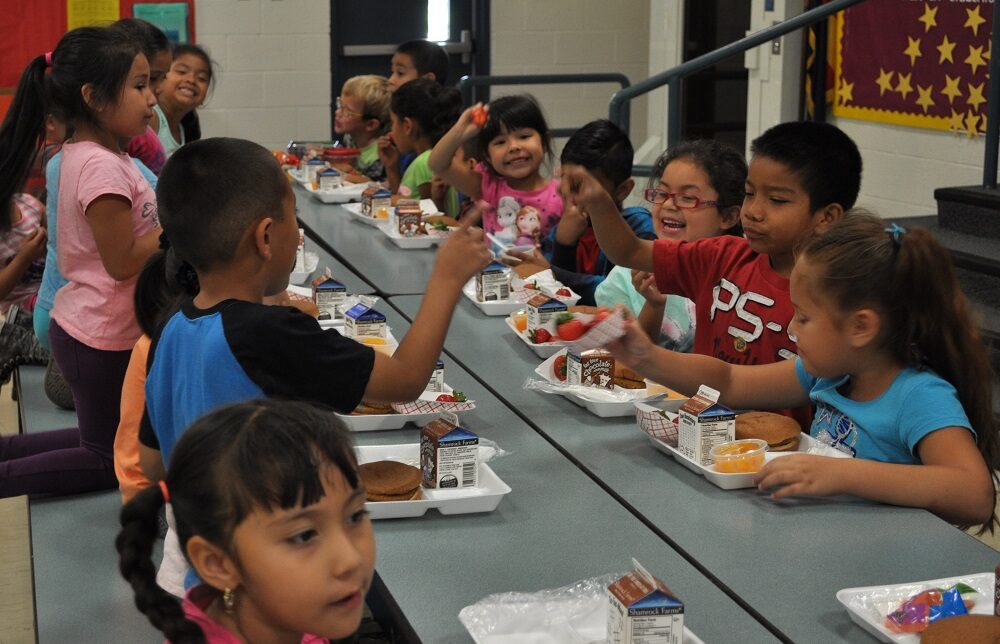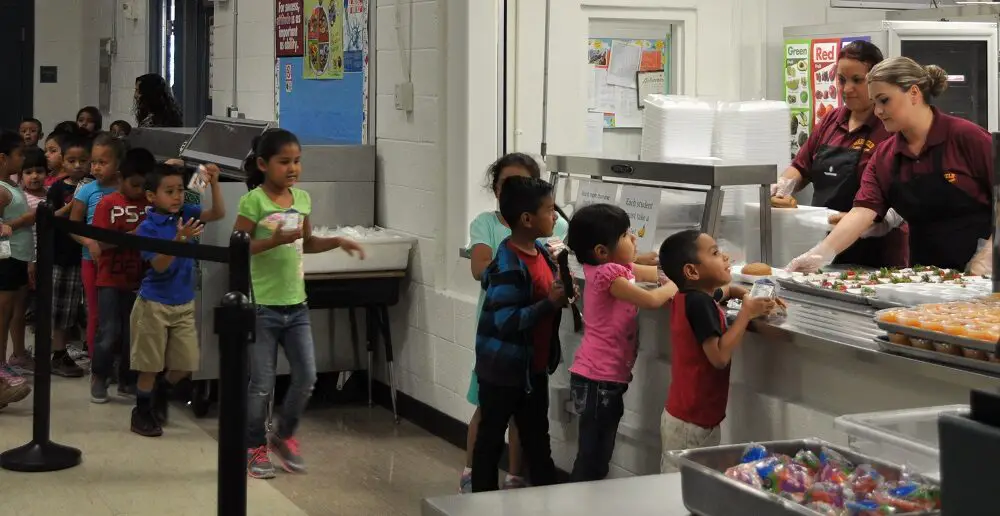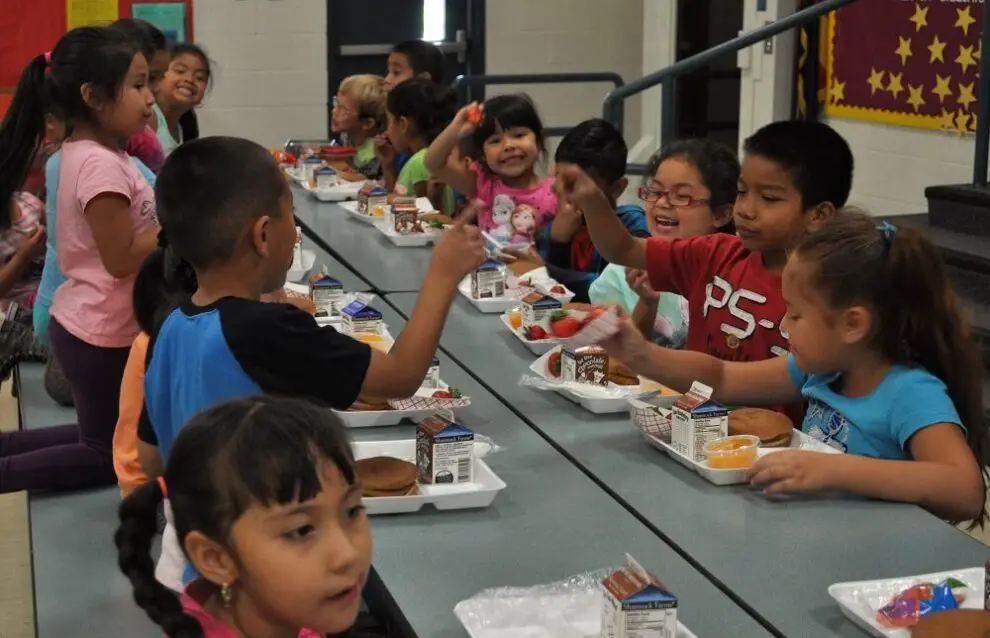Many of us have been forced to slow down a bit over the past few months. We are suddenly working from home and unable to go to the gym. Crafting with our kids more than ever before.
While there is so much uncertainty at this time, one thing has stayed constant: The articles, Instagram posts and Facebook Lives regarding ways to boost the immune system!

Dr. WiSH – William S. Hesse, Ph.D., co-founder of Core Purpose Consulting Group “Making your healthy school WiSH come true”
Our team has always been about “wholesome meals fueling healthy lives,” and we’ve long sung our own anthem of “making the cafeteria an extension of the classroom,” but 2020, in its unprecedented ways, has challenged our mission to the core.
We have seen thousands of students benefit from the quick pivots of area schools that wanted to not only continue to educate but nourish the students in our communities. Simply put, you can’t learn if you’re hungry.
For those who don’t know, school food service is one of the nation’s largest food service providers. And like the food industry as a whole, has risen to the occasion of an unprecedented pandemic.
This is the sixth of 12 articles in a series for AZEdNews on the school’s role in design and implementation of “healthy schools” across America as it relates to all learning environments. Featured resources are “The Ultimate Guide to Healthy Home Learning,” “The Ultimate Guide to Healthy School Design and Implementation.” and “The Ultimate Guide to Building a Healthy Culture,” coming July 15 available at CorePurposeConsulting.com.
For perspective here are some statistics:
Participation, Meals Served and Program Cost
National School Lunch Program (NSLP) Average Daily Participation:
Nearly 100,000 schools/institutions serve school lunches to 29.8 million students each day, including:
- 20.2 million free lunches
- 1.8 million reduced price (student pays $0.40)
- 7.7 million full price
- 4.9 billion lunches are served annually
NSLP Annual Cost:
13.83 billion in federal dollars, including:
- 12.59 billion in reimbursements
- 1.24 billion in commodity costs
School Breakfast Program (SBP) Average Daily Participation:
Over 90,000 schools/institutions serve school breakfasts to 14.71 million students each day, including:
- 11.77 million free breakfasts
- 0.77 million reduced price (student pays $0.30)
- 2.17 million full price
- 2.42 billion breakfasts are served annually
SBP Annual Cost:
- 4.4 billion in federal reimbursements
- No commodity entitlement
We are a team of national experts from across the United States as it relates the Whole Child approach to learning. This article features our alliance partners from Pisanick Partners, the leading experts in food nutrition services. Mention this article prior to 7/20 and receive 50% off the purchase of the Guide.
Symbiotic relationship between nutrition and learning
In today’s mainstream society, dietary habits have little to do with providing the necessary nutrients for the body to operate on an optimal level. Unfortunately, they have more to do with convenience, lack of education about food products, and social influence. Most people know that the types of food you consume have a direct impact on your health. This is really the only reason most people choose not to eat ice cream for every meal. However, knowing how different foods affect overall health is not as common.
You can’t be creative, inspired, optimistic, happy nor healthy without food, bottom line. We use the word “hangry” with our students – you know that fussy feeling you have which science can connect to a low or unstable blood sugar level, dehydration and overall deficiency of vitamins and macronutrients – whole grains, proteins? Add in the ever present little viral sphere that has us all living a new socially distant, masked and limited “new normal” we now are seeking ways to optimize our immune system and health – insert “proper nutrition” here!
It seems as though everywhere we turn, we see “5 Tips to Boost the Immune System!”, “ Eat for Your Immunity!” and now is the time to “Focus on Self Care Today!”
Yes, all of these concepts are helpful and relevant. Yes, we need to hear this information.
Although, as a dietitian, I have a feeling that you already know that eating vegetables, avoiding sugar, meditation, exercise, and 7 or more hours of sleep each night is crucial when it comes to supporting immune health. However, the goal is to have those habits ingrained into your daily routine. We want your foundation of immunity built BEFORE danger and disease strikes.
Why is education important in making the best diet choices?
The average person probably does not know when to consume specific nutrients to produce the best possible health outcomes. For example, eating protein for fuel is not efficient at all, but eating protein after working out provides the amino acids needed to repair and build muscle. Intermittent fasting, which has recently gained attention in the fitness world can work great for some people, but can cause extreme fluctuations in blood glucose that is ill advised for people that are prone to diabetes.
The average person probably doesn’t realize that there are also a lot of harmful ingredients added to many of the processed foods on the market. Among these ingredients are chemicals that have no nutritional value at all and can interfere with the natural chemical reactions that occurs in digestion. Many of them also contain processed white sugar, which not only makes the food more addictive, but also feeds yeast in the body, increasing susceptibility to infection. If the average person did know these things, it would likely change some of the decisions they made about the way they eat.
You also need to consider that some of the education about food that is provided to the general public comes from biased sources.
How does a person’s diet affect their education?
During the pandemic things got “REAL” really fast – from all angles schools hit roadblocks and detours, but continued to write new verses of the “Do What you Can” anthem. For more facts on impact, The School Nutrition Association, a professional organization that continues to advocate for all things child nutrition in schools is providing a glimpse into the “day in the life” of schools as they continue onward with courage and commitment to feeding our nation’s children.
Conversely, nutrition plays a big part in education. When a person is malnourished, their nervous system is greatly affected and the brain is a big part of the nervous system. There are 6 essential nutrient groups that need to be present in a person’s diet.
All six are important and they include carbohydrates, fat, protein, vitamins, minerals, and water. Carbohydrates are the easiest thing for the human body to convert into usable energy. If you have low energy, you will not be able to focus on learning.
Fat is necessary for carrying fat-soluble vitamins through the body to complete their necessary functions in the nervous system and the rest of the body.
Protein provides the body with amino acids necessary for the production of neurotransmitters that are essentially responsible for the entire function of the nervous system.
Vitamins are crucial to learning because they can also affect energy levels and other neurological functions.
Minerals are directly related to the body’s pH levels, and a mineral imbalance can have a psychological impact that could inhibit learning.
Hydration is important for carrying all of the other nutrients though the blood.
Having a sufficient amount of each essential nutrient is important to maintain the body’s homeostasis and allow learning to even take place.
Having too much of something can be just as detrimental as being nutrient deficient. The most obvious example of this is the impact of a high-sugar diet. High-sugar diets can cause inflammation in the brain and cause memory problems. The “sugar rush” experienced will also produce a lot of other behaviors that will distract the focus necessary for learning.
 Students at Garfield Elementary in Phoenix eating their meals. Photo by Lisa Irish/AZEdNews
Students at Garfield Elementary in Phoenix eating their meals. Photo by Lisa Irish/AZEdNews
How does a daily routine affect nutrition?
Convenience has arguably the biggest influence on what people eat and when they eat. The fast food industry is thriving for a reason. Many people rarely have time to plan out healthy, nutritious meals and prepare them. Instead they opt for readily available snacks or meals that require little planning or preparation, and these are generally not the healthiest options. Many foods that are packaged for convenience are loaded with sodium and other preservatives that can have a negative effect on the body. Having a daily routine of working long hours and having an extended period of time between meals can lead to an imbalance between insulin and blood glucose.
Weekly meal prep is a pretty good way to make sure that you don’t fall into the convenient food trap. Mason jar salads, balanced meals in zip-lock or Tupperware containers are easy to put together and easy to store. There are many online resources that provide a variety of meal prep recipes and they do become pretty convenient if you prepare enough for the entire week and package them in perfect proportions.
Divide tasks into manageable segments. If attempting to eat healthy 3 meals a day is overwhelming to you, then break it down by focusing on individual meals. Start my planning 1 meal a day and chose the easiest meal to make that change. Focus on choice planning, shopping and preparation for just hat meal. When you are comfortable with our new routine strategize ways to tackle your 2nd meal.
How does nutrition affect a person’s daily routine?
When you have low blood sugar, you are tired and unable complete your daily tasks efficiently. The same can be said if you are lacking certain vitamins or if you are dehydrated. People tend to alter their behavior when they lack energy. Eating big meals that are heavy in fat and protein can also temporarily alter your energy level because they require a certain amount of energy to digest. Your diet can affect your sleep patterns as well, which can carry over into the rest of your daily routine.
Nutritional needs can vary slightly in different people. The key is to research and plan out your food options so you maintain a healthy balance of nutrients throughout the day, so that it does not have a negative impact on productivity or energy. It is also recommended to communicate your habits with a physician and/or nutritionist to make sure you are on the right track.
How does social influence affect nutrition?
It is no secret that social media has a strong hold on society today. This is even true regarding nutrition. You cannot scroll through YouTube or Facebook without seeing advertisements for different fad diets or food dishes. There are influencers that call themselves foodies that post nothing but blogs and pictures of the meals they are consuming. It is sometimes tempting to even contribute to that culture ourselves when we try a new dish or revisit a favorite one. It really does influence food choice. Even having a conversation with someone telling you about some fantastic thing they recently ate, tends to have an effect on us. This is why the advertisement business is so successful.
The mere mention of something appealing can have us salivating over it and on a mission to get it. Even going out with friends can lead to bad nutrition if your friends tend to patronize establishments with a lot of fried food or other unhealthy options.
The good news is that it isn’t all bad. When you surround yourself with people that make positive food choices, it is easy to make similar decisions. Use social media to your advantage. Follow people that consistently post healthy recipes and it will inspire you to follow suit. When you want to grab a bite to eat with your friends, and your friends enjoy healthier meals, it is easier to pick healthy dining options. Finding resources like a company wellness ambassador, a School Wellness Champion, a School Health Advisory Council (SHAC) team or Student Wellness Advocacy Team (SWAT) can really help you find better options for nutrition and even point you in the direction of a good produce co-op.
 Garfield Elementary students choose items for their lunch with help from food service staff members.
Garfield Elementary students choose items for their lunch with help from food service staff members.
How does nutrition affect a person’s social habits?
If you are not well nourished, you don’t really want to go out and socialize. You feel sluggish and unmotivated, especially if it is affecting your sleep patterns. Easy tasks become a struggle and any socializing that does take place does not usually involve the most positive interactions.
When you are maintaining a healthy diet, you feel better and you have the energy and motivation to actually go out and socialize. You will engage in more activities and have a more optimistic demeanor. When someone is living their best life in great health, they want to share the secrets of their success. They want to blog and post about it, and encourage others to make better decisions. This is one of the best things about social media. It provides an outlet to share information and encouragement, especially when it comes to health.
Eating problems include compulsive eating, anger eating, stress eating, comfort eating, binge eating and night time eating, which all stem from our inability to manage emotions. If you find yourself engaged in these self defeating behaviors, try an focus on your emotional side. Listen to what your body is telling you. Get re-attached to your feelings. Recognize the differences between true hunger and an emotional urge to eat. Take time to respond not react. Think about your eating choices. Choose a response other than eating. Wait 15 minutes before you consider food as the answer. Go for a walk, read a book or call someone.
Here are my top 5 tips to use food as medicine:
- Eat Your Antifungals & Antibacterials. Did you know that certain foods have powerful antifungal and antimicrobial properties? Totally true. Nature’s best medicine comes disguised as oregano, garlic, onion, Manuka honey, turmeric, and ginger. Try to incorporate at least one of these foods daily. Soups, smoothies, and stir-frys tend to work best.
- Choose Color. It’s no secret, eating a rainbow each day can dramatically improve human health by reversing damage at the cellular level. Aim to consume 3 different colors at each meal. Example: Morning smoothie that contains spinach, strawberries, and blueberries. Bonus: dark leafy greens are incredible when it comes to detoxification.
- Feed Yourself with Fermentation. Fermented foods are one of the best kept secrets when it comes to boosting human health. Aim for 2 TBSP each day of fermented foods like kimchi, sauerkraut or 4-8 oz of Kombucha (check out the recipe below!). Fermented foods serve as premium fuel for the good bacteria in our gut, thus helping to strengthen our immune system.
- Real Food for Real People. No matter how divided this country is regarding food beliefs -keto, paleo, vegan- there is one thing all experts agree on: eating real food! Our body was designed to digest and metabolize food that does not contain a bar code. The more chemicals and additives we ingest, the more bogged down our immune system becomes. It’s as simple as that!
- Focus on Correcting & Preventing Nutrient Deficiencies. Consider speaking to your doctor or dietitian about testing for micronutrient deficiencies. Believe it or not, many Americans are suffering from chronic health issues that could have been completely prevented if vitamin and mineral stores were up to par. In fact, numerous studies have shown that more than 90% of Americans are deficient in one or more nutrients at the minimum dose to prevent deficiency diseases!
Remember, Rome was not built in a day and the same can be said for your immune system. Focus on one new tip to incorporate each week and soon enough, these habits will become second nature!
We have been navigating this “new normal” together for the past few months. We wanted to share some of the kind words from interns, teachers, and most importantly, the families we serve.
Frontline Essential Worker Perspective: Tina Hastings Woodridge School District, Ohio
“This has made me think of how lucky we are as kitchen workers right now. We are able to do what we do and do what we can. As we are classified as “essential workers” this is something I take dear to my heart. We go throughout our days feeding kids and doing what we love and sometimes we forget how essential we really are.
While you are making orders and trying to rearrange menu items remember this is what we do. While you are cooking food and preparing vegetable & fruit cups, remember this is what we do. While you are wrapping and bagging items, remember this is what we do. While you are washing your hands and sanitizing every nook and cranny, remember this is what we do.
While you are handing a meal out to a student or parent, preparing a bag to be delivered to a student, remember this is what we do. When that student receives this meal and is eating a nutritious breakfast and lunch every day because of what we do, REMEMBER THIS IS WHAT WE CAN DO!!!! I just want to send out a heartfelt THANK YOU to you all for what you do and what you can do. Because of you, hundreds of thousands of students are eating a healthy nutritious meal that they might not have had every day and especially in this time of COVID 19.”
Parent Perspective:
“This is very helpful! My family has gone from a two parent income to one. I think you all are doing a great job and it is greatly appreciated. Thank you”
“Without the district’s help, some days food would have been a minimum [of food] in our house.”
“I do appreciate the meals that we received. Thank you for all that you have done during these times. It kept variety during my kids’ days, and kept me from taking unnecessary risks and multiple trips to the grocery store. It eased my anxiety of food shortages and fear of COVID. I can’t thank you all enough. “
“I just wanted to say thank you for what you and all those volunteers are doing. Nothing can come close to the gratitude you guys deserve. I’m pretty sure a lot of us parents feel that way. Just know that you are appreciated in these hard times and everyday other than. Thank you from all of us parents for your continued efforts for these children. You deserve praise today and everyday!!!!! Thank you.”
Teacher Perspective: 2nd Grade Teacher, Woodridge Local School District
“You and your food service team are the heroes. Preparing and bagging all these meals is an incredible task. Kudos to you and all that help you!”
Core Purpose Consulting Video: Student Perspective
What’s next?
As we all are gearing up for fall 2020 and busy working out strategies for a successful return to school/learning come August. When I say “strategies” I mean plans A thru Z with “what if’s,” and variations on the moving target we are all tracking. From the steady stream of health related guidance from the CDC to the state by state directives and guidance that are the fruit of the many restart task forces we are keeping our finger on the pulse of the all things best practice, advice and resources for heroes who wear aprons, hairnets, and now MASKS daily to carry on the business of school food service.
What is at the heart of the matter is our passion to continue to support the unique needs of all of our schools as they commit to students around the nation and certainly the world with a common vision – well nourished, supported, educated, and guided youth are OUR FUTURE! It is our collective responsibility to claim a seat at the table, lean into the conversation, and own the success of our programs to support the YOUTH we serve. Now more than ever we need to aspire to collaborate with a vision to support the whole child – we’re ready for the challenge, are you?
For more information watch our trailer below and visit us at corepurposeconsulting.com or all your healthy learning/school needs.











